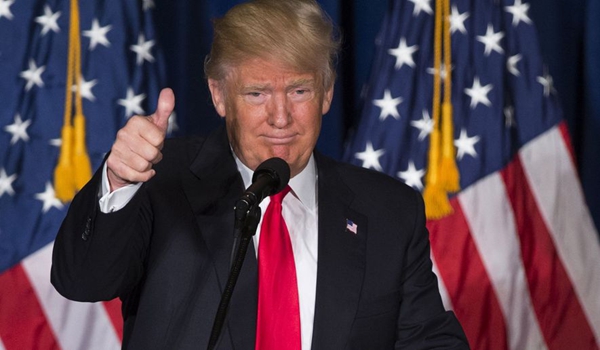Trump goes zero-sum on China
- By Sumantra Maitra
 0 Comment(s)
0 Comment(s) Print
Print E-mail China.org.cn, May 1, 2016
E-mail China.org.cn, May 1, 2016
|
|
|
Republican presidential candidate Donald Trump gives a thumbs up after giving a foreign policy speech at the Mayflower Hotel in Washington, Wednesday, April 27, 2016. |
So, this is what Donald Trump had to say about China in his maiden presidential campaign foreign policy readout at the Center for the National Interest, previously known as the Nixon Center.
"Our president has allowed China to continue its economic assault on American jobs and wealth, refusing to enforce trade deals and apply leverage on China necessary to rein in North Korea. We have the leverage. We have the power over China, economic power, and people don't understand it. And with that economic power, we can rein in and we can get them to do what they have to do with North Korea, which is totally out of control."
The U.S. has a tradition of presidential frontrunners highlighting their foreign policy credentials before the actual debate begins between the presidential nominees. As the world waited for Trump to outline his foreign policy ideas, it was expected that there would be a little China bashing, something which is probably more garish only because it took place at the Nixon Center, named after the man who opened up to China and essentially changed the rules of the game between the two countries.
It is a Herculean task to assign a logical theoretical framework to Trump's foreign policy doctrine, of "America first," if one can call it a doctrine that is, but here it is. It's a mix of the hegemonic peace theory combined with mercantilism, with a little bit of zero sum game theory to lace it up. Here are a few of Trump's specific policies, which are as incoherent as the man trying to sell it to the American public.
Trump criticized Obama and Clinton's foreign policy, as well as Bush's overreach, saying that America needs to get away from nation building, and look inward. Simultaneously, he wants to ensure global peace projecting American strength. He wants to rebuild the American military and make it the strongest force in the world, while simultaneously cutting the funding. He wants to assure American allies that they are under the security umbrella while simultaneously wanting them to pay up more for their security, like shopkeepers in India have to pay local toughs to save their shops from looting during riots. He will come to a deal with Russia, but start a trade war with China, but also ask South Korea and Japan to build their own individual deterrence, thereby ruining over 50 years of global nuclear non-proliferation.
If one therefore cuts out all the incoherence, this is what is left. Trump, or his foreign policy advisors, has targeted a section of the American people who want to carry on feeling the superpower pride in world affairs, but who don't understand what it takes to get that and who are tired of paying for it anyway. No matter what happens, I still say there is a very low chance of Trump being the U.S. president, even though it is now a full statistical possibility as Trump is successful in breaking the dogma that is the U.S. foreign policy bipartisan establishment. The rules of Washington DC, which are considered bible truths, are now being redrawn, or at least reflected upon.
Trump never clears the basic underlying contradiction in his speech though. How can he, on the one hand, say that the U.S. was too weak under Obama and Clinton, that it needs to go inward and isolate itself and refocus on all financial commitments to allies, while simultaneously being so strong that it can force Russia and China to come to a deal with the U.S., or force its allies to pay up for their security?
However, one needs to understand that it never mattered to his electorate anyway, as they firstly either don't care about foreign policy that much, as long as it is not related to building a wall on the Mexican border to stop Islamic terrorists, however incoherent that may sound; nor are they knowledgeable about the nuances of how global diplomacy works. Trump views the world as a zero sum game. Everything to him is a deal that can be done, if only one has the right leverage and knows the right buttons to push. This is what differentiates him from traditional realists, even when he laces up his speeches with realist talking points against intervention. Realists, everywhere in the world, talk about the concept of "relative gains."
To sum it up, Trump doesn't have the capability to make any great power, nor can it force allies to pay up more for their security, selling American lives for money, as an 18th century mercantilist. What he can do, is start up devastating trade war with China, which will ruin the U.S. as well, while ruining its 70 year-old alliance systems and diminish America's role in the world. Given that either of those two scenarios are highly unlikely, one can safely advise policy makers to take his advice with perhaps a pound of salt.
Sumantra Maitra is a columnist with China.org.cn. For more information please visit:
http://www.china.org.cn/opinion/SumantraMaitra.htm
Opinion articles reflect the views of their authors only, not necessarily those of China.org.cn.







Go to Forum >>0 Comment(s)